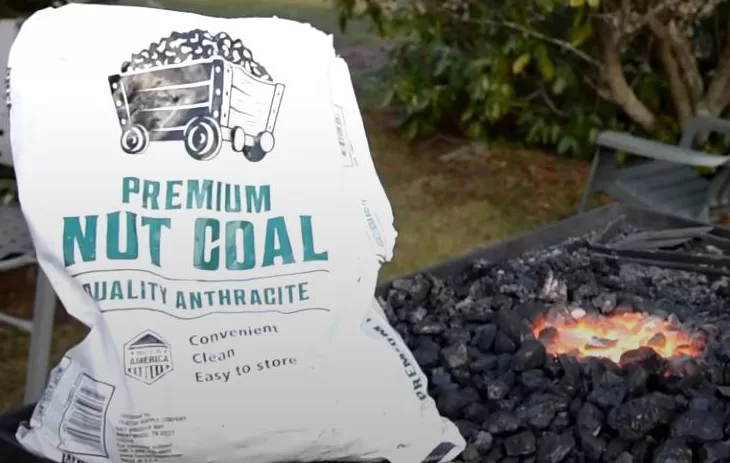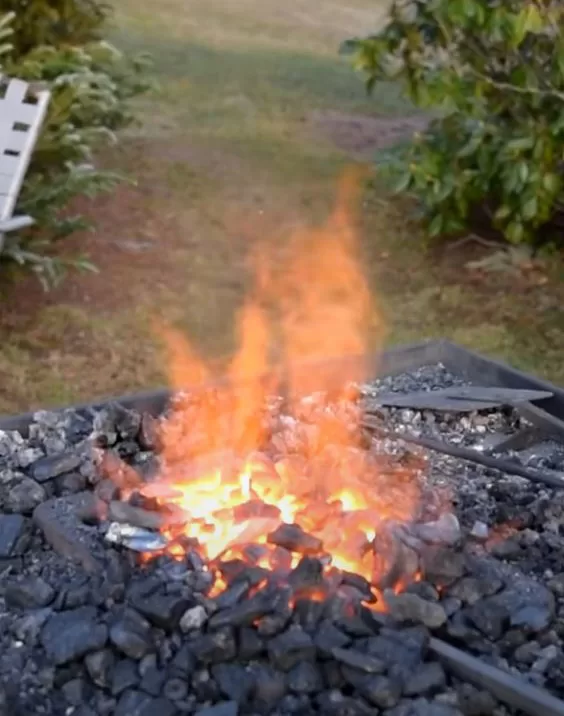Most blacksmiths prefer forging with bituminous coals over anthracite coals for forging, for several reasons. Mainly because it’s easier to light, gets to temperature quickly, and stays hot for longer.
I found several bags of nut coal at my local Tractor Supply the other day and decided to give it a try. And after doing a bit of testing and research, I’m here to share with you what I learned about forging with nut coal.
What is Nut Coal?
Nut coal is a type of anthracite coal which is a hard, shiny, black mineral that is made up of nearly pure carbon. It is most commonly known as “Nut Coal”, however, it may also be called chestnut coal as well. It gets the name due to its size and shape, which is bigger than rice and pea coal, but smaller than stove coal.
Can You Forge with Nut Coal?
Just like other types of anthracite coals, nut coal can also be used in all types of blacksmithing projects. It will take a bit longer to light and reach forging temperature but once it gets going, it will do just fine.
I was able to forge a couple of knives with it instead of my normal coal. With the right amount of height and volume, I was even able to forge welding with it.
Benefits of Forging with Nut Coal
Now that you know nut coal can be used for forging, here are the benefits of using it:
Locally Sourced:
Nut Coal is often produced locally and you can find it at local feed stores or Tractor Supply stores. This means you don’t have to go searching high and low for it, especially if you live in a rural area. Buying locally sourced coal also cuts down on its cost.

Cheaper than Bituminous Coal:
When it comes to price, nut coal is hands down cheaper than any bituminous coal you can find. I was able to grab several bags from Tractor Supply for around $9 per 40-lb bag. Compare that to this 40-lb bag on Amazon which cost almost 8 times more.
Virtually Smokeless:
If smoke is an issue, nut coal is the way to go, especially if you’re trying to forge with neighbors close by. I was surprised to see how little (almost zero) smoke was being produced when forging with nut coal.

Hot Enough for Forge Welding:
Most types of coals can reach high-enough temps to forge weld. It took some time and a decent amount of coal, but I was able to forge weld just fine with nut coal.
Little to No Sparks:
Another plus is that there were barely any sparks flying around when I was forging. This was a huge relief for me as I do not have to worry about them getting stuck in my clothes or setting the house on fire!
Tips for Forging with Nut Coal
To make your life easier, here are some tips on using nut coal for forging:
Mix with wood or bituminous coal to start:
The hardest part of forging with nut coal was getting it lit and getting to temp. It took a few tries and I found that mixing it with wood or bituminous coal helps it get going faster. You can also just start a small amount of coal going and add layers of nut coal while it’s burning.
Break it into smaller pieces:
When it comes to forging with coal larger chunks will take much longer to get going. The TS bag had a few pieces that were just too big to throw in a forge. I had to break those down with a hammer before I could use them.
Be patient:
Finally, when it comes to forging with nut coal, patience is key. It may take longer than bituminous coal but like all things good, the results are worth the wait!
Conclusion
Nut Coal is an underrated and often overlooked type of coal. It is plentiful, cheap, smokeless, and hot enough to forge weld with.
While it may take longer to get going than bituminous or coke coal, with a little patience and the right techniques you can use nut coal for all your forging projects!
So if you’re looking for an affordable alternative to bituminous or coke coal, Nut Coal is definitely worth a try.



